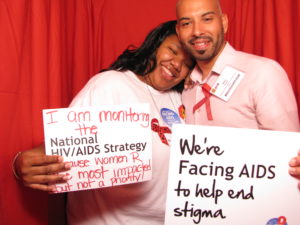November 21st, 2017
Thoughts on Stigma
David Herman, MD

David Herman, MD, is a 2017-18 Chief Resident in Internal Medicine at the University of Southern California / LAC+USC Medicine Center in Los Angeles
“What are we legally able to do? I don’t want to say the ‘quarantine’ word, but I guess I just said it. […] What would you advise, or are there any methods, legally, that we could do that would curtail the spread?”
These sentences were spoken by Betty Price, an American politician with a seat in the Georgia House of Representatives for the 48th district. Her questions were posed to Dr. Pascale Wortley, director of the HIV/AIDS Epidemiology Surveillance Section at the Georgia Department of Public Health, during a videotaped discussion regarding barriers to access of adequate healthcare for patients with HIV. Although she later stated that these remarks were taken out of context, in 2017, the uttering of these phrases, marked by what would appear to many to be discrimination and prejudice, should at the very least warrant swift and continual condemnation and, truthfully, should motivate constituents to question whether leadership proposing this type of strategy is the type that they deserve. This is especially true in a state where the rate of HIV diagnoses per 100,000 people in 2015 was second only to the District of Columbia, according to the CDC, and a state that demonstrates a need for true reform in HIV care.
What is all the more devastating about these remarks is that Representative Price is not only a politician, but, more importantly to the purpose of this piece, a physician trained in anesthesiology. She practiced her chosen field for more than 20 years in Roswell and Marietta, GA, serving on multiple boards, including the Medical Association of Atlanta and the Medical Association of Georgia. Moreover, she is a past president of the American Medical Women’s Association in Atlanta and a recipient of the President’s Award from the Medical Association of Atlanta and a Phenomenal Women of North Fulton Award. In short, she is an exceptionally educated and truly accomplished woman and a physician of considerable influence within and beyond her community.
 Thus, the implication from her, a respected doctor, that those infected with HIV should, by the very nature of their infection, be considered for quarantine, despite all that we know today about the nature of this disease, is incredibly alarming. It is a prime example of what drives fear among individuals affected by this disease. Comments like this are what attach stigma to this diagnosis. And for many, it is a contributing factor to keeping them from investigating their status or seeking appropriate care.
Thus, the implication from her, a respected doctor, that those infected with HIV should, by the very nature of their infection, be considered for quarantine, despite all that we know today about the nature of this disease, is incredibly alarming. It is a prime example of what drives fear among individuals affected by this disease. Comments like this are what attach stigma to this diagnosis. And for many, it is a contributing factor to keeping them from investigating their status or seeking appropriate care.
The comments by Dr. Price are just an example of how stigma persists. Defined, stigma is a mark of disgrace associated with a particular circumstance. It runs rampant throughout medicine and extends significantly beyond HIV and AIDS. Every time we apply our own sense of negative judgment to a disease or condition, we implicate those who may be suffering from it. Judgment often stems from our own prejudices against certain populations or behaviors. Societal conceptions of intravenous drug users or those who engage in sex work, for instance, can color our perception of hepatitis C or sexually transmitted infections and imbue those diseases with negative connotations. People at risk for contracting them may avoid evaluation or treatment rather than suffer the discrimination associated with diagnosis or follow-up. And this prejudice can expose itself in many ways: It can flow like an avalanche through the middle of a House of Representatives inquiry on barriers to care, or it can leak out in elevator conversations when cracking jokes about a patient’s new diagnosis of syphilis. Either way, it can have a rippling effect on those that hear it and tighten stigma’s hold.
This seems equally as evident in the discussion of mental health, a topic certainly on the minds of many as reforms to healthcare are currently being proposed. The way we deal with mental health in this country and around the world is a major problem. Not only is access to care among those with mental health disorders grossly inadequate, but the social stigma associated with a diagnosis or treatment of a mental health disease can further debilitate individuals already suffering from debilitating diseases. A survey of more than 1700 adults in the U.K. published in 2000 found that the most commonly held beliefs regarding mental health problems were that people who suffer from them are dangerous and that many mental health problems are self-inflicted. The authors concluded that these beliefs, among others they identified in their study, contributed to social isolation, distress, and difficulty in employment (Crisp AH et al. Br J Psychiatry 2000; 177:4). Though we can certainly acknowledge that mental health disease can of course lead to aggressive and violent behavior in some, the generalization that mental health disorders equal danger is a troubling stereotype to apply to an entire population, especially one that needs to be embraced with care and not pushed away by fear. Similarly, the implication that mental disease is self-inflicted is at its very core insulting to those inflicted, erecting walls around those in need.
 This is why stigma is so devastating; not only does stigmatization affect the way patients seek evaluation and engage in treatment, but it affects the way doctors engage and support patients in need. When this relates to mental health, for instance, it demonizes an individual who suffers internally from psychiatric disease and further isolates him or her. When this relates to transmissible disease it results in improper identification of those who require treatment and can facilitate the passage of infection between individuals. In general, it worsens outcomes and impedes solutions.
This is why stigma is so devastating; not only does stigmatization affect the way patients seek evaluation and engage in treatment, but it affects the way doctors engage and support patients in need. When this relates to mental health, for instance, it demonizes an individual who suffers internally from psychiatric disease and further isolates him or her. When this relates to transmissible disease it results in improper identification of those who require treatment and can facilitate the passage of infection between individuals. In general, it worsens outcomes and impedes solutions.
So, as doctors on the front line of this issue, what can we do? It is incumbent upon us as a profession to take care with how we conduct ourselves and communicate. When we allow our own prejudices to infiltrate our communications to patients or others, we do them a drastic disservice. Because the short answer to Dr. Price’s question is not to isolate or quarantine but to test adults as per CDC Guidelines for HIV infection and to plug them into effective and supportive care as indicated. And yet by saying what she said, she has already sewed her seeds, unearthed her own prejudice, and further affected the way in which a vulnerable population views the medical profession, preventing us, in my opinion, from truly being able to find an answer to the problem.
The specter of stigmatization is held tightly within our society and will not easily be shaken. As such, we need to look long and hard within ourselves and ask whether and how we are contributing to it. We have a duty to our patients and much of that is not allowing our own bias to affect the work that we do and the care that we deliver. This is as important in our treatments as in our communications. Ultimately, educating ourselves on various conditions and confronting our own views on them, advocating for the rights of our patients, supporting those patients through their diagnoses and treatments, working to normalize illness by taking it out of the social construct from which discrimination arises, and treating a disease for what it is — simply a disease and not a commentary or judgment on the individual with it — these are some strategies to employ. But the words that we use in our discussions are just as important. Hopefully, as we continue as a profession to discuss these issues, we will continue to grow to the benefit of our patients. And until such a time as stigma no longer exists, it is also important to continue to call out words such as Dr. Price’s and to mind our own.



This is a great article and rings true to many interactions I’ve had both with patients and friends. My friends admit hesitancy to share certain aspects of their health with their physicians for fear of not being believed or being judged. As a provider I’ve struggled with initiating discussions about these stigmatized issues in a sensitive way to facilitate more open dialogue. Recognizing our own bias is an important first step towards providing healthcare without judgment.
An important reminder that the way we speak with our patients and about our patients can have far-reaching effects and is as important as our ability to make diagnoses or to treat them.
Brilhante posição! O isolamento não favorece o paciente nem inibe a transmissão do vírus. O cuidado e tratamento eficaz, associado a informação são com certeza eficaz.
[Brilliant position! Isolation does not favor the patient or inhibit virus transmission. The effective care and treatment associated with information are certainly effective.]
From HHS- “For example, hospitals use isolation for patients with infectious tuberculosis. Quarantine is used to separate and restrict the movement of well persons who may have been exposed to a communicable disease to see if they become ill.”
In this case, I think you, and the original speaker, Representative Price, meant “isolation”. Nonetheless, point well taken.
It is so disappointing that someone who is as knowledgeable as Dr. Price is (she went to medical school) and being the public figure that she is suggest this.
Great piece
The term “chief” resident is racist